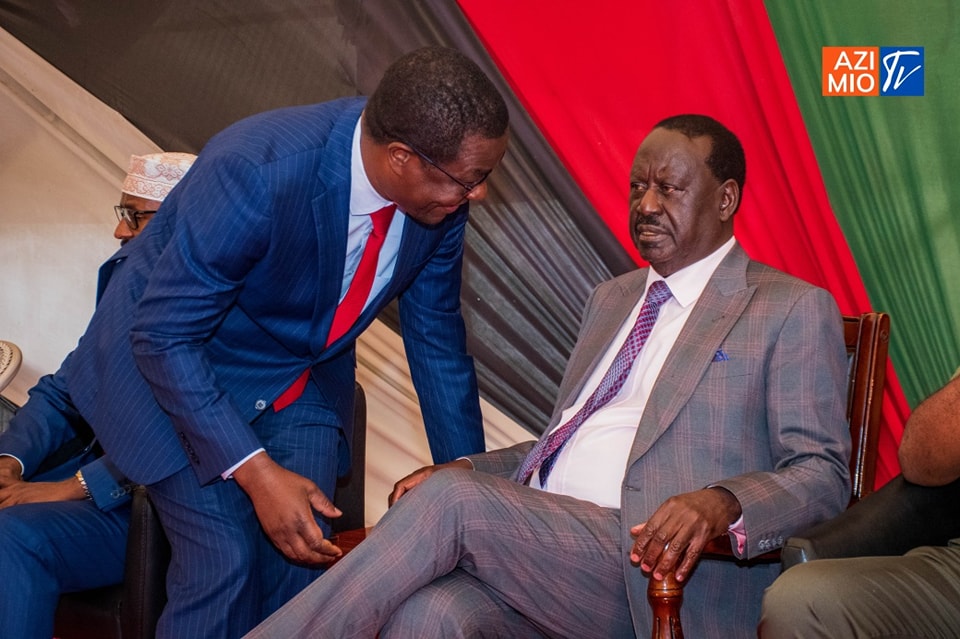By REUBEN MUSONIK,
POLITICAL EDITOR, THE DISPATCH DIGITAL
-
Sale!

CURING HYPERTENSION: Simple Healing Secrets Revealed
$20.00Original price was: $20.00.$7.00Current price is: $7.00. Add to basket -
Sale!

Diabetes Reversal: Stop Medication and Live Worry-Free For Life
$20.00Original price was: $20.00.$5.00Current price is: $5.00. Add to basket -
Sale!

The Rise of the Silent
$7.00Original price was: $7.00.$3.00Current price is: $3.00. Add to basket -
Sale!

Win Back Your Financial Freedom: A Guide to Build Your Wealth
$7.00Original price was: $7.00.$3.00Current price is: $3.00. Add to basket
Opposition leader Raila Odinga is facing fierce backlash after publicly endorsing the involvement of India’s Adani Group in two major infrastructure projects: the expansion of the Jomo Kenyatta International Airport (JKIA) and the management of Kenya’s power transmission sector. This endorsement has sparked widespread criticism, with concerns ranging from privatization of key national assets to the transparency of the deals involved. Social media platforms such as X (formerly Twitter) and Facebook have been flooded with criticism, as citizens, civil society, and some political figures voice their opposition.
Odinga’s Position: Defending Foreign Investment
Odinga defended the Adani Group in recent speeches, highlighting his experience with the company during visits to Gujarat, India. He noted that the group transformed a swamp into an industrial hub and revamped Mumbai’s crumbling airport into a modern facility, which he believes makes Adani a suitable partner for Kenya. In his view, such partnerships are essential for Kenya’s development, especially given the government’s financial constraints.
Odinga argued that Kenya cannot afford to alienate foreign investors and urged the public to focus on the long-term benefits. He warned that politicizing such Public-Private Partnerships (PPPs) could damage the country’s reputation and reduce its attractiveness to investors, particularly as neighboring countries like Tanzania and Ethiopia continue to draw foreign capital.
He further stressed the need for transparency in PPP processes, calling on the government to enhance regulatory frameworks to ensure fairness. “While we must ensure investors earn a return, it is crucial to protect national interests, including labor rights and environmental safeguards,” Odinga stated during a recent public event in Mombasa.
Public Outcry: Privatization Concerns and Sovereignty Risks
The announcement of Adani’s involvement in expanding JKIA, through a 30-year Build-Operate-Transfer (BOT) model, has raised alarms among advocacy groups and ordinary citizens. Many fear that the project would amount to the privatization of one of Kenya’s most profitable state assets, transferring substantial revenue to a foreign conglomerate. The Kenya Human Rights Commission (KHRC) and the Law Society of Kenya (LSK) are among the most vocal critics, questioning the wisdom of ceding control over such a critical asset to a private investor.
Moreover, the proposed involvement of Adani Solutions Limited in Kenya Power’s operations has added to the public’s frustration. Kenya’s energy sector is already plagued by unreliable service and high costs, and critics argue that foreign involvement could further reduce accountability and local participation. Some have warned that outsourcing control over such vital infrastructure could make Kenya vulnerable to foreign influence in sectors that affect the daily lives of citizens.
Political commentators have also raised concerns about the secrecy surrounding the deals. According to reports, the agreements were fast-tracked with little public consultation or competitive bidding, prompting questions about the transparency of the PPP process.
-
Sale!

CURING HYPERTENSION: Simple Healing Secrets Revealed
$20.00Original price was: $20.00.$7.00Current price is: $7.00. Add to basket -
Sale!

Diabetes Reversal: Stop Medication and Live Worry-Free For Life
$20.00Original price was: $20.00.$5.00Current price is: $5.00. Add to basket -
Sale!

The Rise of the Silent
$7.00Original price was: $7.00.$3.00Current price is: $3.00. Add to basket -
Sale!

Win Back Your Financial Freedom: A Guide to Build Your Wealth
$7.00Original price was: $7.00.$3.00Current price is: $3.00. Add to basket
Social Media Reaction: Calls for Accountability
The controversy has gained momentum on social media, with the hashtags #JKIAPrivatization and #KenyaPowerDeals trending on X and Facebook. Many users criticized Odinga for what they see as a reversal of his earlier stance on foreign influence and public accountability. “Is this the same Raila who once fought for transparency in government deals? Now he’s defending backdoor privatization,” one post read. Others accused Odinga of political expediency, suggesting that his recent alignment with President William Ruto’s administration is driven by personal interests.
Civil society activists and influential commentators have also joined the conversation, demanding that the government release the full details of the agreements. “Public assets must not be auctioned off without proper oversight. This is about Kenya’s sovereignty and the livelihoods of our people,” tweeted Boniface Mwangi, a well-known activist.
Political Ramifications: Strained Alliances and Public Distrust
Odinga’s support for the Adani Group has placed him at odds with parts of his traditional support base, which had expected him to champion greater government accountability. The fallout is already being felt within the Orange Democratic Movement (ODM), where some members have expressed unease over his position. Analysts suggest that the backlash could weaken Odinga’s influence within the opposition and erode public trust in his leadership.
The controversy also highlights Odinga’s complex relationship with President Ruto’s administration. While Odinga has long been seen as a critic of the government, his defense of these deals suggests a shift toward a more cooperative stance. This shift has prompted speculation about whether Odinga is positioning himself for future political realignment.
Balancing Development and National Interests
The debate over the Adani deals touches on a broader issue: the challenge of balancing the need for foreign investment with the protection of national interests. Kenya’s infrastructure needs are vast, and the government has limited resources to meet them without external support. However, the fear of losing control over strategic assets remains a major concern for many citizens.
Odinga has urged all stakeholders to approach the matter pragmatically, warning that delays or cancellations could jeopardize future investment in Kenya. He emphasized the need to avoid politicizing the debate, cautioning that failure to manage such partnerships carefully could stall infrastructure development for years.
Conclusion: A Defining Moment for Kenya’s Economic Policy
As the controversy continues to unfold, the Kenyan government faces a difficult task: securing foreign investment while maintaining public trust and protecting national interests. The Adani Group’s involvement in JKIA and Kenya Power offers a glimpse into the complex trade-offs involved in PPPs.
Odinga’s defense of the deals reflects a broader recognition of the importance of foreign capital for Kenya’s development. However, the public outcry demonstrates the need for greater transparency and public involvement in shaping such partnerships. Whether the government can strike the right balance remains to be seen, but the debate has already sparked a crucial national conversation about Kenya’s economic future and sovereignty in the face of globalization.
-
Sale!

CURING HYPERTENSION: Simple Healing Secrets Revealed
$20.00Original price was: $20.00.$7.00Current price is: $7.00. Add to basket -
Sale!

Diabetes Reversal: Stop Medication and Live Worry-Free For Life
$20.00Original price was: $20.00.$5.00Current price is: $5.00. Add to basket -
Sale!

The Rise of the Silent
$7.00Original price was: $7.00.$3.00Current price is: $3.00. Add to basket -
Sale!

Win Back Your Financial Freedom: A Guide to Build Your Wealth
$7.00Original price was: $7.00.$3.00Current price is: $3.00. Add to basket




